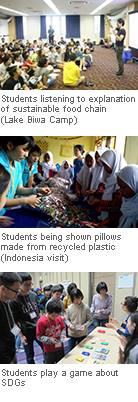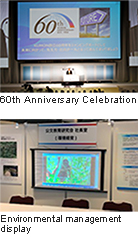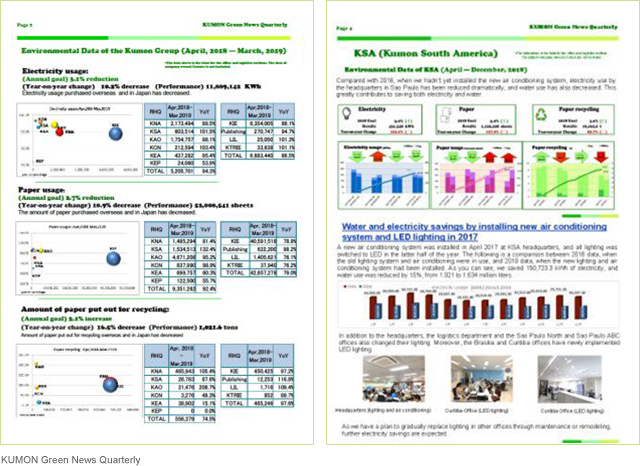Environmental Communication
Let’s talk about the environment in English:
English Immersion Camp (EIC)
An English camp for children, English Immersion Camp 2018, was held for the 18th year during the summer holidays. A total of 224 students in the third to sixth grades participated. This program helps children to deepen their understanding of the world, while spending days with camp leaders and staff from all over the world, communicating in English.
We worked together at the Biwako EIC camp with the Dari K chocolate shop of Kyoto and at the Izu EIC camp with the environmental group WWF to discuss, using English, the question of a sustainable food supply chain.
The objective was to encourage the students, who will create the future, to become aware of problems that are occurring around the world and to think about how each of them could make a contribution to local communities.
In addition, 30 students visited Indonesia on an overseas study tour that took place in March of 2019. On the study tour students visited and ESD (Education for Sustainable Development)elementary school supported by the WWF as well as a coffee growers group operated by women. Tour participants also learned about Indonesian culture and environmental problems in Indonesia. They saw pillows and bracelets made from recycled plastic and exchanged ideas regarding activities aimed at solving environmental problems.
In March of 2019 events were held in English to encourage students to think about their dreams and objectives as well as to raise their consciousness regarding problems in society. Participants were students who had attended an English Immersion Camp and who had experienced the joy of communicating in English. The two venues, one in Tokyo and one in Osaka, were connected via video link. A total of 156 Japanese students as well as camp leaders from 18 countries participated.
This year’s theme was SDGs. Participants played the 2030 SDGs Game. The 2030 SDGs Game is a multiplayer, in-person, card-based game that simulates taking the “real world” into the year 2030 and realizing the 17 SDGs. Players use the “money” and “time” they are given to carry out “projects” and see what kind of results are gained. They experience trying to positively affect society and the environment.
The SDGs are global goals and the Kumon Institute of Education is also trying to make a contribution to their realization. Students are encouraged to think about why the SDGs are necessary for the world and about what kind of changes will be brought about through their realization. They share their ideas in English and discuss what they can personally do to realize the SDGs.
※ English Immersion Camp: Kumon event held every summer. Students spend time with camp leaders hailing from a variety of countries around the world while using English as a communication tool. This enables them to study the importance of mutual understating.

Consciousness raising activities regarding environmental management for Instructors and other related individuals
The Kumon Institute of Education holds an Instructor’s conference once per year for Instructors in Japan. In February of 2019 the Kumon 60th Anniversary Celebration and Kumon Instructors Conference was held in Yokohama. There were more than 7,500 participants at the event including Instructors, staff, and other concerned individuals from all over the world.
At the 60th Anniversary Celebration we received words of encouragement from the professional shogi player Yoshiharu Habu, who is a former Kumon student, as well as from Sir Fazle Hasan Abed, founder and chairperson of BRAC, which is the world’s largest non-governmental organization and is based in Bangladesh. Kumon has been working with BRAC since 2015 to help spread the Kumon Method in poorer areas of Bangladesh.
We also held and exhibition at that time which explained the Kumon environmental philosophy and Kumon’s efforts to support the forest preservation activities of the WWF Japan. This deepened the understanding of Instructors and staff regarding the importance that Kumon places on environmental preservation efforts.

Information disclosure through environmental reports
Since FY2013, the Kumon Group has been posting environmental reports on our website making information public about our environmental preservation activities and data (electricity usage, CO2 emissions, paper usage, and paper recycling), in addition to the Kumon Environmental Philosophy and Environmental Policy.
Environmental education for Kumon Staff
The Kumon Group provides environmental education to all staff members in order to help raise their awareness and deepen their understanding of the environment. In FY2017 at training sessions for new management level staff and at other staff training sessions, e-learning was used to improve environmental awareness. Staff studied global environmental problems, environmental management and issues related to environmental regulations.
Furthermore, by displaying posters and data about the environment in offices, each Group company has been successful in raising environmental awareness every year. We now provide more opportunities to learn about the environment and share information among staff members.
Distribution of in-company environmental newsletter
Every quarter, the Kumon Group distributes the Kumon Green News Quarterly in Japanese and English to all Group companies.
The newsletters include quarterly environmental data by region, as well as environmental activity reports sent from each Group company to be shared worldwide.
In addition, each Group company promotes their own environmental communications, for example by delivering environmental news to staff members.

- Kumon's Environmental Activities
that Spread throughout the World - Environmental activities by North America, South America,
Asia and Oceania, China, Europe and Africa, and Japan
Kumon's
Environmental
Activities